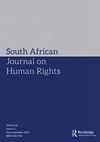Introduction to special issue: separation of powers, the judiciary and the politics of constitutional adjudication
IF 0.6
4区 社会学
Q3 LAW
引用次数: 0
Abstract
This special issue of the South African Journal on Human Rights arises from a general call for papers that was issued in October 2019. The special issue has come to fruition in circumstances that none of us could ever have imagined at the time of its conceptualisation. No one imagined that within six months from that date a health pandemic would sweep across the world, plunging humanity into crisis and bringing life to a virtual standstill while simultaneously redefining the norms of human movement, interaction and exchange. Indeed, the impact of Covid-19 and the regulations taken in order to protect public health were felt everywhere, including our editorial processes. While the pandemic brought death, despair and upheaval and disrupted the order of social, political, cultural, economic and religious life as we know it, questions around the involvement of the courts and the judiciary in the nation’s political contestations became more pronounced. Rather than abating, in line with the slowness induced by the pandemic, these political contestations gathered greater momentum and urgency. For example, as I write this introduction, the number of politically charged matters being litigated or headed towards litigation continues to accumulate, further heightening the interand intra-branch tensions between constitutional structures. At the time the special issue was being conceptualised, our collective frame of reference was informed by the Jacob Zuma presidency and characterised by an increase in civil society and political actors involved in disputes turning to the courts to resolve what were clearly political controversies. Little has changed in that the accumulation of politically charged cases involving former president Zuma, persons thought to be associated with him and, more generally, the governing African National Congress (ANC) continues. The pinnacle point in this respect, at the time of writing, is the Constitutional Court case emanating from the Zondo Commission on State Capture in which the former president has been found guilty of the crime of contempt of court and sentenced to an effective 15-month term of imprisonment. There are, of course, other matters not involving Zuma that have been equally mired in political controversy. Profound questions have been raised concerning the separation of powers doctrine and where the lines should be drawn under our system of constitutional专刊导论:三权分立、司法与宪法裁判的政治
《南非人权杂志》的这期特刊源于2019年10月发布的论文征集。这个特刊在概念化时是在我们任何人都无法想象的情况下实现的。没有人想到,从那一天起的六个月内,一场健康大流行病将席卷全球,使人类陷入危机,使生活几乎陷入停滞,同时重新定义人类运动、互动和交流的规范。事实上,新冠肺炎的影响和为保护公众健康而采取的法规随处可见,包括我们的编辑过程。尽管新冠疫情带来了死亡、绝望和动荡,扰乱了我们所知的社会、政治、文化、经济和宗教生活秩序,但围绕法院和司法机构参与国家政治斗争的问题变得更加明显。随着疫情造成的缓慢,这些政治争论非但没有减弱,反而积聚了更大的势头和紧迫性。例如,在我写这篇引言的时候,正在提起诉讼或即将提起诉讼的政治指控事项的数量不断增加,进一步加剧了宪法结构之间的部门间和部门内紧张关系。在这个特殊问题被概念化的时候,我们的集体参考框架是由雅各布·祖马总统提供的,其特点是参与争议的民间社会和政治行为者越来越多地求助于法院来解决明显的政治争议。几乎没有什么变化,涉及前总统祖马、被认为与他有关联的人,以及更广泛地说,执政的非洲人国民大会(ANC)的政治指控案件的积累仍在继续。在撰写本报告时,这方面的最高点是宗多国家抓捕委员会提出的宪法法院案件,在该案件中,前总统被判犯有藐视法庭罪,并被判处有效的15个月监禁。当然,还有一些与祖马无关的事情同样陷入了政治争议。人们对三权分立学说以及我们的宪法制度应该在哪里划分界线提出了深刻的问题
本文章由计算机程序翻译,如有差异,请以英文原文为准。
求助全文
约1分钟内获得全文
求助全文

 求助内容:
求助内容: 应助结果提醒方式:
应助结果提醒方式:


